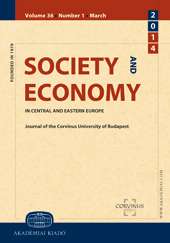Fiscal cycle effects in the pattern of the Hungarian state expenditures
Fiscal cycle effects in the pattern of the Hungarian state expenditures
Author(s): Ágnes HalászSubject(s): National Economy, Governance, Economic history, Economic development, Public Finances, Fiscal Politics / Budgeting
Published by: Akadémiai Kiadó
Keywords: political budget cycles; state expenditures; new democracy; Hungary;
Summary/Abstract: In this paper we aim to investigate what role fiscal cycles played in the development of the Hungarian state budget balances since the change of regime in 1989 until the parliamentary elections held in 2010. The literature has found that political budget cycles (PBC) are more typical in less developed countries with a shorter period of experience with democratic institutions, like the post-socialist transition economies. Nevertheless, empirical studies point out that this phenomenon has been disappearing over time. By testing the six parliamentary elections in Hungary until 2010, we show that discretional governmental actions of pork barrel spending were apparent more or less in almost each election period, peaking in the last decade. The most typical form of the fiscal cycles in Hungary proved to be social transfers to households including old-age benefits, family support or price subsidies, but also public sector wages were subject to PBC. As a result, state budget balances were significantly shaped by the cyclical movements of fiscal laxity and restrictions, resulting in strong fluctuations in fiscal balances and an overall high budget deficits in the two decades under review.
Journal: Society and Economy. In Central and Eastern Europe ǀ Journal of the Corvinus University of Budapest
- Issue Year: 36/2014
- Issue No: 2
- Page Range: 263-283
- Page Count: 21
- Language: English

